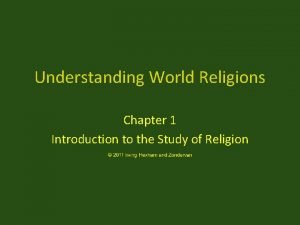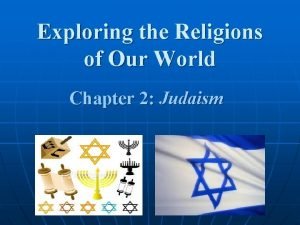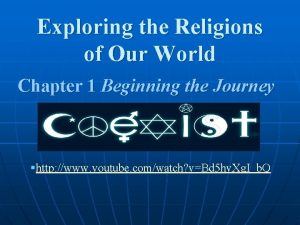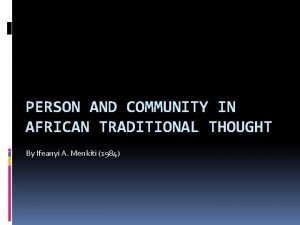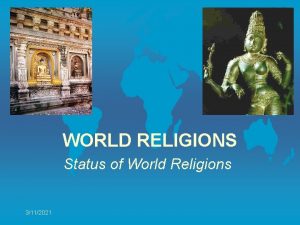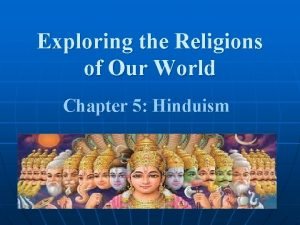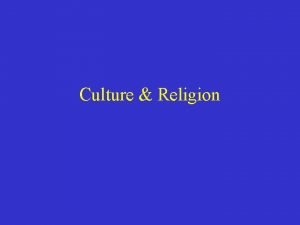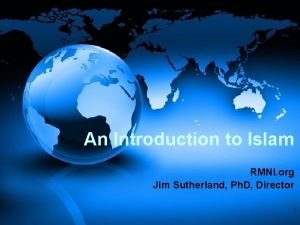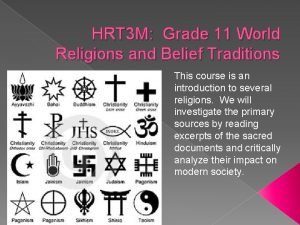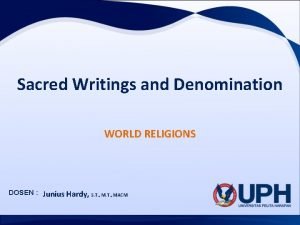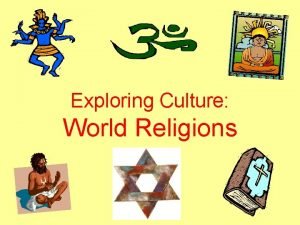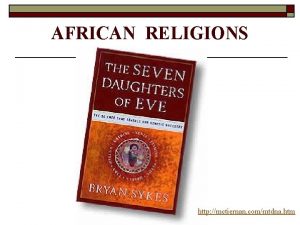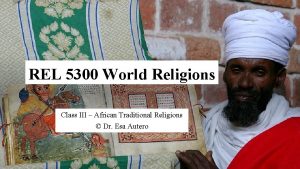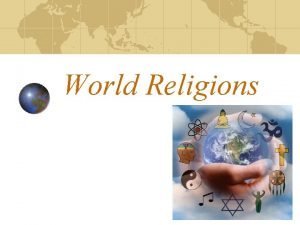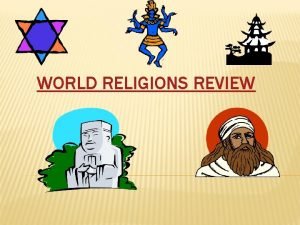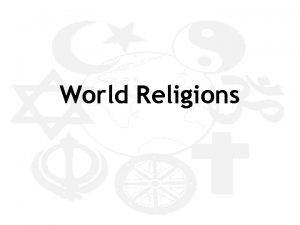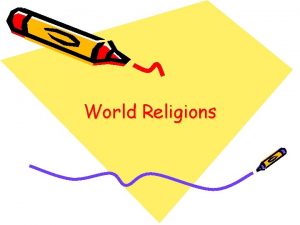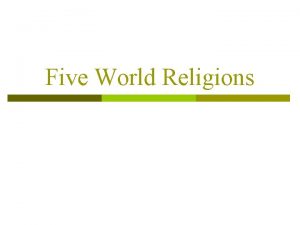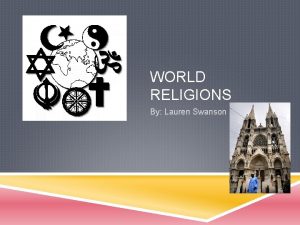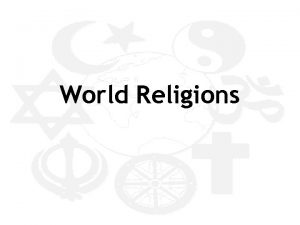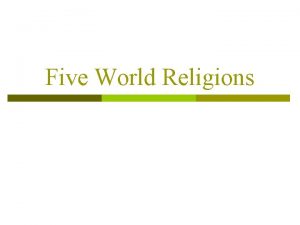Understanding World Religions Chapter 3 African Traditional Religions











- Slides: 11

Understanding World Religions Chapter 3 African Traditional Religions © Irving Hexham 2011

African Traditional Religions The notion of “traditional religion” often evokes images of traditional, or pre-industrial, societies like those seen above where women hoe fields and transportation involves sledges rather than wheeled vehicles. Although true of certain areas in the recent past such images are very misleading. Traditional African religions originated in these sort of situations, but have migrated to cities and are now complex affairs which have adopted well to the modern world.

African Traditional Religions In the above picture the healer, Estelle Nxele, on the right, instructs apprentices in “traditional” Zulu healing practices. Before devoting her life to healing she was a very successful manager in a large South African company at a time when they were seeking to promote competent Blacks. She gave up her very promising career after an illness during which she says her ancestors told her that she was “called” to be a healer. Brought up as a Christian she saw no contradiction between her belief in the power of the ancestors and Biblical teachings.

African Traditional Religions Notice the leaflets on top of the cabinet containing medicines. Estelle Nxele was proud of her diagnostic skills and quick to point out that many illnesses were better treated by a Western medical doctor at a local hospital. Therefore, she worked closely with university trained doctors and often sent patients to the hospital.

African Traditional Religions This story from The News World was published with banner headlines on 4 November 1980. That is before anyone voted in the crucial Presidential election that brought Ronald Reagan to power. The accompanying story gives a remarkably accurate picture of the final election results. The newspaper’s owner, Sun Myung Moon, the founder of the controversial Unification Church, clamed that God revealed the election results, and story, to him in a dream. This is a good example of a seemingly inexplicable event that may be regarded as a primal experience.

African Traditional Religions The writings of German theologian Friedrich Schleiermacher, who is often called the “father” of modern theology, are a good place to begin when attempting to understand African religions. Rejecting traditional Biblical theology, he argued that religion is rooted in the human experience of the divine which he described as a “feeling , ” “sense” or “intuition” of “absolute dependence” Today many conservative Christians reject Schleiermacher’s view of theology. Nevertheless, his insights help us understand the ways in which religious experiences, like those of many African healers, give rise to both religious practices and beliefs. Today many scholars adopt the term “primal, ” meaning “basic” or “root, ” to describe the type of experience Schleiermacher wrote about. Friedrich Schleiermacher (1768 -1834)

African Traditional Religions The Abbey in the Oakwood (1808 -1810) by the German Romantic painter Casper David Friedrich (1774 -1840) The above painting of a ruined abbey, like many others by Friedrich, is intended to convey a sense of awe and the transitory nature of life. As such it consciously reflects the views of his friend Friedrich Schleiermacher. In it the artist seeks to lead the viewer to reflect on the nature of eternity and to evoke what may be called an experience of the primal.

African Traditional Religions The above chart shows the ways in which primal experiences, such as dreams and visions may be related to various religious traditions. It is also important to note that they can be found in established world religions where they often provoke revitalization movements.

African Traditional Religions Although, as far as we know, sociologist Emile Durkheim (1858 -1917) never visited Australia, or met an Aborigine, his interpretation of their religion in terms of a “sacred-secular” distinction has shaped the way many people think about religion. To understand African religious traditions it is important to realize that such a distinction can rarely be found. For most Africans religion is a holistic experience. As an African told Fred Welbourn “my religion is like my skin, it is part of me. ”

African Traditional Religions Most of us use computers and “know” how they work. But, how many of us really understands how computers work? Traditional African religions explain the world in ways that appear to work in practice. In this sense belief in things like healing and sorcery are rational beliefs that explain the experience of individuals.

African Traditional Religions Charles Dickens' (1812 -1870) character Marley’s ghost, from his ever popular novel A Christmas Carol (1843), reminds us that the idea of an unseen world is not as far from the consciousness of Americans and Europeans as many people think. What does this tell us about African religions and our own attitudes to religion?
 World religions chapter 1
World religions chapter 1 Exploring the religions of our world chapter 2 pdf
Exploring the religions of our world chapter 2 pdf Exploring the religions of our world chapter 1 pdf
Exploring the religions of our world chapter 1 pdf Person and community in african thought
Person and community in african thought Agnotie
Agnotie Exploring religions chapter 5 large
Exploring religions chapter 5 large Distribution of religions in the world
Distribution of religions in the world World religions percentage
World religions percentage World religions grade 11
World religions grade 11 Judaism founder
Judaism founder Junius hardy
Junius hardy Religion islam
Religion islam
